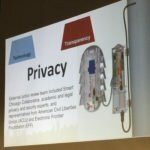Next up in our Chicago School of Data interview series is the Illinois Sentencing Advisory Council (ISAC). The ISAC is a government agency created to collect, analyze and present data from all relevant sources to more accurately determine the consequences of sentencing policy decisions and to review the effectiveness and efficiency of current sentencing policies and practices.

Adam Garcia spoke with Nate Steinfeld who serves as Research Director for the ISAC about what the organization does and how they use data. Andrew Seeder did the transcription and pulled together threads, then Christopher Whitaker put together this post.
If you like what you’re learning here, consider joining us at the Chicago School of Data Days on September 19 and 20, 2014.
Smart Chicago: Tell me a little more about your organization, give me a summary of what you guys do? Nate: "The Sentencing Policy Advisory Council, there's four of us, including Mystic. We're the staff of a council of legislators and stakeholders in the criminal justice process, and we inform our stakeholders and also our legislators and the governor on criminal justice--trends, and we advise them on the cost of the system. We don't make recommendations, we only evaluate what's out there and try to pull together all the resources across the criminal justice realm into a cohesive information packet to explain what's going on. So the biggest thing that we do is evaluate proposed legislation and propose changes to the practices, evaluate how it will play out in the end, and how that will affect tax payers."
The Sentencing Policy Advisory Council was developed by the Criminal Law Edit, Alignment and Reform (CLEAR) Commission. The CLEAR Commissioners studied and reorganized the Unified Code of Corrections in an effort to make it less confusing and easier for the public and practitioners to use. That process led to the conclusion that, although many agencies collected statistics and data about sentencing in Illinois, no agency compiled sentencing data specifically to perform comprehensive analysis for reporting to policy makers. This agency reports directly to the Governor and the State Assembly.
Smart Chicago: How does data drive what you guys do? Nate: "Data is what we do, just because we work with Department of Corrections data, arrest data from the state police and law enforcement, and we pull together all that information as well as trying to get stuff from service providers and just anyone who touches the criminal justice person through the process--trying to get a picture of what's actually happening. So it's really a big data problem that the state is trying to get a grasp of, but it's a problem that...everyone's siloed in the past and we're trying to get a little more broad than the silos."
Smart Chicago recently looked at the problem of siloed data for our Crime and Punishment in Chicago Project. There are few entities out there that are looking at the criminal justice system as a whole.
Smart Chicago: Can you guys give me an example of something you do really well as far as collecting data is concerned or a tool that you guys use? Nate: "One of the coolest things we've been working with, although we haven't been able to finalize it, is a cost-benefit model that's been developed by the MacArthur Foundation, actually. And Pew helped fund the Washington State Institute for Public Policy which is a policy group out in Washington that does cost-benefit analysis for the legislature and the state. They developed a cost-benefit model to estimate changes in the criminal justice system: What are the costs of locking people up, policing people, processing them through the courts, and also the costs of victimizations and the costs of battery: Hospitalizations, medical services, pain and suffering. Put all that into one big model to estimate. So if you lock fewer people up you might see an uptick in crime, but are you dropping, offsetting, the increases in crime? It's a really super cool way of distilling all of that demographic research, social science research. We know what happens when you release a certain number of peole to a fair amount of people. We should be able to estimate what the costs to the total system will be. It won't be perfect, but it will give you a good sense. So we've been trying to bring that to Illinois. Using the big data that I talked about before, the DOC data, the police data, to try to estimate similar figures that Washington used to create their model for here. We've got all of that stuff done. The problem we're running into is cost for the system. What does it cost to supervise someone on probation? We talked to the probation officers, which are through the administration of Illinois Courts, they're a judicial branch function, so they often refuse to cooperate with us. What are the costs of probation? If you divert people away from prison and send them to probation, you're saving a ton of money versus locking them up in a small cage, but what are the actual costs of probation?...And then there's additional programs and services you can provide in the community. What are the costs of those? We know that some of those programs reduce recidivism, sending people through the system fewer times, if you can treat them. This cost-benefit model should pull a lot of this stuff together into a fairly single line item that a legislator can look at and say, 'If I fund this program I will see costs go up a little bit, but long run I'm getting huge savings from lower victimizations and incarcerations.' But until we get the cost data pretty well nailed down--Washington State's data, the cost of probation in Washington is different from here."
With the state spending $60 million dollars on overtime alone for Illinois prisons, the issue of cost has come to the forefront.
Smart Chicago: The system, what is it you're trying to bring to bear? You said it was a cost? Nate: "We're using Pew and MacArthur to fund this, so Pew is technical assistance for us. The cost-benefit model is in an Excel spreadsheet with visual basic. You enter all these variables, you calculate from those raw source data, and they you enter what the costs are and then you tell it to run the program. Which is awesome, cause it's been embedded by economists' different academic institutions. People say it's good and from what I can tell it is. The problem is cost of programming. Not so much cost on our end."
When doing interviews, one of the common themes is the lack of staff needed to analyze data. With the organization only having a staff of four, we wanted to get a better sense of how they handled the workload.
Smart Chicago: Sounds like you guys have a lot of data and it's exactly what you need, but with a staff of four, you look at these giant spreadsheets and go, 'Wow...'. Nate: "I mean, it's fine. Mystic pulled last week data from the DEA on what are the prices of heroin over the past 30 years. So you pull that and it's price per pure gram, but do we want, what's the value of the street average purity, then do we inflate it or deflate it." "[Mystic, third person in the room, a staff member it ISPAC:] We have comparison data, but it's not..." "[Back to Nate Steinfeld:] We have national data but it's not--what can we use that's more specific to the state of Illinois? So going back to one of your questions about Chicago. Part of our struggle--and this is why it's good to have someone in Springfield, since we cover the entire state--obviously Chicago is a big driver, and Chicagoland of the collar counties as well, so that's something that we try to keep in mind. We don't want to ever look too Chicago focused, even though this is our big driver.
Smart Chicago: If you had an unlimited budget, have you thought about anything you would want or need? Nate: "The big challenge right now, I think, connecting all of these siloed data sources--DOC is rolling out right now an enterprise system, to connect their data with parole data, even though they're both run DOC, so that they can track someone once they release them a little bit better. With an enterprise system they should be able to connect other sources. Fingers crossed, I'm hoping they can run in that direction. Other stuff from the jail might be able to connect up with this enterprise system instead of having to be re-entered. All of this has really weird, complex civil liberties issues, which makes it difficult, but I think we as a state should be trying to address them and dealt with them. If you drop out of school, how quickly do you end up in DOC? If you drop out of school with great grades, does that change the effect? There are whole things you can do with that so you can analyze it in a different way than when it's all in the silos. Public health data would be able to connect up here too. That's super creepy. I understand there's a lot of concerns with trying to lock someone up when they have a disease. That shouldn't be a factor of it's an individualized criminal justice matter. At the same time, big picture-wise, maybe, legislators do want to know some of that. I think that if I could have my one wish would be connecting all the data to make a master file of information on people would be, we could do all kinds of cool things and make all kinds of progressive policies. It's also super super creepy, so I don't really know if I can actually advocate for it. I think along with that there are all of these people interested in data, and some of them, such as yourself, are doing a good job at actually doing a good job to be able to intelligently analyze it, we've gone to the government hack night, there's some really smart people trying to work with big data problem. It'd be awesome to make this the same as city of Chicago releases on their portal, the state should be doing that. At the same time, then you get some creepy things, like well then if employer's are able to bounce stuff off of there you are now, like--yes, you should suffer if you...did something wrong [committed a crime], but at the same time if you did something twenty years ago and an employer does a background check and can find it instantaneously, then are we stigmatizing people and continuing bad consequences of dumb policies in the past. So again, there are civil liberties drawbacks, but I feel that connecting the data and making it public would really open up the door...for public investigative research on a whole new level. It would allow nonprofits to target their services way better. I kinda think this is the next thing which will get us to Star Trek, a society that can more easily address poverty issues. At the same time, it could also go the opposite direction and be dystopian. In the mean time I just try to answer my fiscal impact statements."
To find out more information about the Illinois Sentencing Policy Advisory Council, you can visit their website at http://www.icjia.state.il.us/spac/index.cfm.






